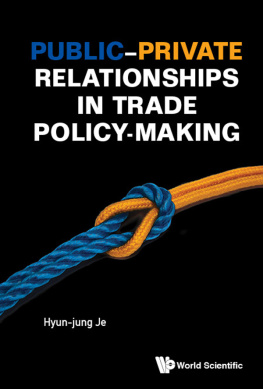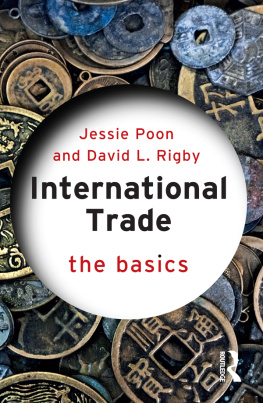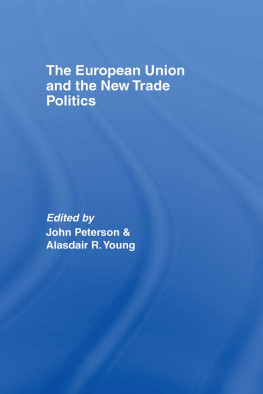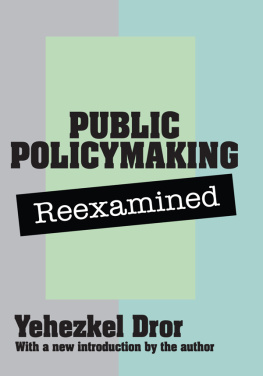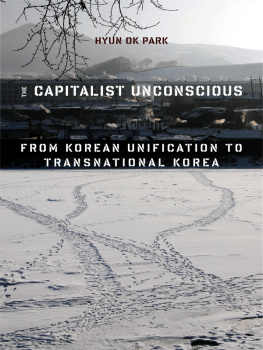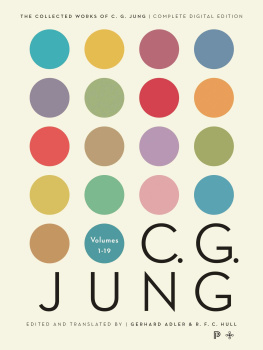Published by
World Scientific Publishing Co. Pte. Ltd.
5 Toh Tuck Link, Singapore 596224
USA office: 27 Warren Street, Suite 401-402, Hackensack, NJ 07601
UK office: 57 Shelton Street, Covent Garden, London WC2H 9HE
Library of Congress Cataloging-in-Publication Data
Names: Je, Hyun-jung, author.
Title: Public-private relationships in trade policy-making / Hyun-jung Je, Korea International Trade Association, Korea.
Description: New Jersey : World Scientific, [2018] | Includes bibliographical references.
Identifiers: LCCN 2018002038 | ISBN 9789813237674 (hardcover)
Subjects: LCSH: Commercial policy. | International trade. | Public-private sector cooperation. | World Trade Organization.
Classification: LCC HF1411 .J3825 2018 | DDC 382/.3--dc23
LC record available at https://lccn.loc.gov/2018002038
British Library Cataloguing-in-Publication Data
A catalogue record for this book is available from the British Library.
Copyright 2018 by World Scientific Publishing Co. Pte. Ltd.
All rights reserved. This book, or parts thereof, may not be reproduced in any form or by any means, electronic or mechanical, including photocopying, recording or any information storage and retrieval system now known or to be invented, without written permission from the publisher.
For photocopying of material in this volume, please pay a copying fee through the Copyright Clearance Center, Inc., 222 Rosewood Drive, Danvers, MA 01923, USA. In this case permission to photocopy is not required from the publisher.
For any available supplementary material, please visit
http://www.worldscientific.com/worldscibooks/10.1142/10924#t=suppl
Desk Editor: Karimah Samsudin
Typeset by Stallion Press
Email:
Printed in Singapore
ABSTRACT
International and national trade policies entail a discrepancy where businesses and other private actors are the main principals that are most affected by trade policies, but governments are the only agents who have the legitimate right to decide such policies. Under the early General Agreement on Tariffs and Trade (GATT) system whose main purpose was to reduce tariff barriers, governments were accepted as the sole agent, and multilateral trade negotiations were led in secret by a club of several developed countries. However, as the volume and the scope of international trade expanded, more attention was paid to the democratic process of trade policy-making which began to have increasingly extensive effects. Furthermore, the worldwide spread of democracy and globalization from the 1960s strengthened the need for transparency and public engagement in trade policy-making. The proliferation of regional Free Trade Agreements (FTAs) since the late 1990s also became a significant momentum for private actors, even in developing countries, to be highly interested in trade policy at the domestic level.
Against this background, publicprivate relationships in trade policy-making both at the international and national levels have transformed and evolved in the direction of enhancing transparency. Countries may undergo change at a different speed in different ways, but the common objective of publicprivate relationships in trade policy-making is to enhance legitimacy and transparency in the decision-making process, maximize social welfare, minimize social conflict and costs, and achieve optimal distribution of resources.
Even though there has been much discussion on publicprivate relationships in trade policy-making at the international and national levels, few analytical frameworks for studies have been suggested so far. Thus, this book attempts to introduce a framework which categorizes three levels of public engagement from transparency and consultation to participation, under three dimensions of trade policy-making processes of negotiations, ratification, and implementation. Based on this basic framework, three models of publicprivate relationships in trade policy-making are suggested: (1) an open state-centered model, (2) a consultation model, and (3) a participation model. This approach can be applied to categorize each country under one of the three models or analyze a countrys evolution from one model to another.
As a result of examining publicprivate relationships according to the aforementioned framework, the multilateral trade regime, or the World Trade Organization (WTO), seems to mainly focus on the first level of enhancing transparency. The WTO has made attempts to strengthen dialogue with businesses and civil society, but their power to affect the intergovernmental decision-making process is still indirect and limited. The dispute settlement body allows the opening of panels and Appellate hearings, and the submission of amicus curiae in practice, but the rules on these issues are still under negotiation with no consensus among Member States. Meanwhile, some regional free trade agreements which involve the United States (U.S.) and the European Union (EU) already contain such rules in the text.
The U.S. has a long history of engaging private parties in its trade policy-making, and most mechanisms of engagement have been institutionalized by trade laws. It is considered that the advisory committees established by the Trade Act of 1974 serve not only as advisors, but also as agenda-setters in trade policy. Furthermore, Section 301 of the Act allows private parties to petition their government and challenge trade barriers through dispute settlement mechanisms. Such mechanisms reveal that the publicprivate relationship in the U.S. is close to the participation model. On the other hand, the EUs public engagement in trade policy-making is a more principle-based and policy-based system, and it can be categorized as a consultation model, with the exception of the Trade Barriers Regulation (TBR). Both the Trade Civil Society Dialogue and the General Principles and Minimum Standards for consultation provide clear guidelines for enhancing transparency and consultation in the trade policy-making process, but not for participation of non-state actors.
Korea, whose economy has rapidly developed with heavy dependence on trade, has recognized the importance of publicprivate relationships in trade policy-making through more than 10 years of experience in concluding free trade agreements. In order to enhance transparency in the process of trade policy-making, Korea has enacted the Trade Treaty Conclusion Procedure Act, and institutionalized public hearings and established a private advisory committee. In addition, the Domestic Measures Committee for Trade Treaties was also established to help the ratification process of trade agreements. Despite these efforts to institutionalize public engagement in trade policy-making, it seems there is not enough concrete activity taking place at the level of consultation, and excessive compensation packages are still offered to veto players in the process of ratification, which hampers optimal distribution of resources. Therefore, the current public engagement in trade policy-making in Korea can be described as a transition-to-consultation model.
In conclusion, the analyses based on the framework suggested by this book have demonstrated that it is useful for examining the level of public engagement of and within a country, and also for conducting comparative studies across countries. They are also meaningful in that they will contribute to facilitating further systemic and analytical studies on publicprivate relationships.



